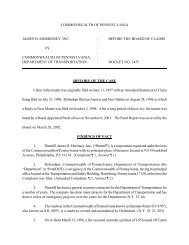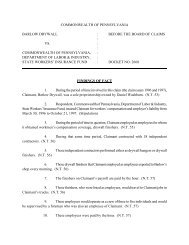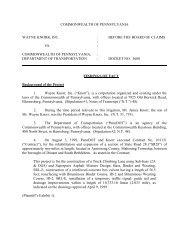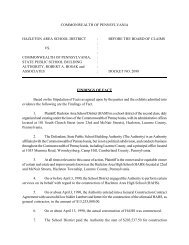3720 - Board of Claims
3720 - Board of Claims
3720 - Board of Claims
You also want an ePaper? Increase the reach of your titles
YUMPU automatically turns print PDFs into web optimized ePapers that Google loves.
Paving undertook to negotiate the movement <strong>of</strong> the utility (i.e. water main). Even though the<br />
contract stated that the contractor had the responsibility to deal with the city to relocate the main,<br />
the court found that, by its acts, PennDOT assumed responsibility for the relocation and<br />
“relieved” the contractor <strong>of</strong> any duty to negotiate. The court found PennDOT liable for the three<br />
months <strong>of</strong> delay expense because PennDOT knew <strong>of</strong> the obstructing water main and did not act<br />
more “expeditiously” in negotiating the relocation after “assuming responsibility for the<br />
negotiations.” As a result, the court found PennDOT “directly interfered” with the contractor “in<br />
a way that was not within either party’s contemplation at the time the contract was signed.” Id.<br />
at 141. The exculpatory clauses were found to be no shield to liability or damages. 18<br />
In fact, the <strong>Board</strong> finds the circumstances and PennDOT's conduct in the case at hand to<br />
be even more egregious than in Coatesville or General Asphalt because, after making his<br />
representations at the pre-job meeting regarding utility pole relocation, Mr. Pilosi then did<br />
nothing for the next six months to follow through on his promises. Mr. Pilosi's representations<br />
that he would handle problems with pole relocation with the Utilities, Mr. Sebastianelli's<br />
assurances <strong>of</strong> same during the many months that Intercounty requested such assistance from<br />
PennDOT, and Mr. Pilosi's deliberate decision to do nothing with this problem, particularly from<br />
18 Other jurisdictions also refuse to enforce exculpatory provisions in similar circumstances. For example, Nello L.<br />
Teer Company v. North Carolina Department <strong>of</strong> Transportation, 2004 WL 5218006 (N.C. Super. 2004) is another<br />
case with facts similar to the case at bar. In Teer, the North Carolina Department <strong>of</strong> Transportation (“Department”)<br />
drafted a contract for a road widening project that required the contractor to rebuild the road using four set phases <strong>of</strong><br />
construction. Three utilities needed to relocate their poles before construction could begin in accordance with the<br />
construction phases. The Department directed the contractor to begin the project even though the utilities had not<br />
relocated any poles and then ordered the contractor to keep working even though it took 18 months for the utilities<br />
to complete their work. The Department ignored the contractor’s requests for a time extension and insisted the<br />
contractor keep working while the Department made continuing revisions to the construction sequence. The court<br />
found that the Department had the duty through its own State Utility Agent to make every effort to expedite the pole<br />
relocations. It held the Department liable because the contactor was denied access to the work site as contemplated<br />
in the contract and had to work pursuant to the changed schedule and not as planned. It found that the contract<br />
implied that the site would be accessible to the contractor and the parties did not anticipate that the contractor would<br />
have to work with poles in place. The court refused to enforce the contract’s exculpatory clauses because the<br />
Department denied the contractor unhindered access to the work and found the Department liable for delay and<br />
disruption damages.<br />
89






